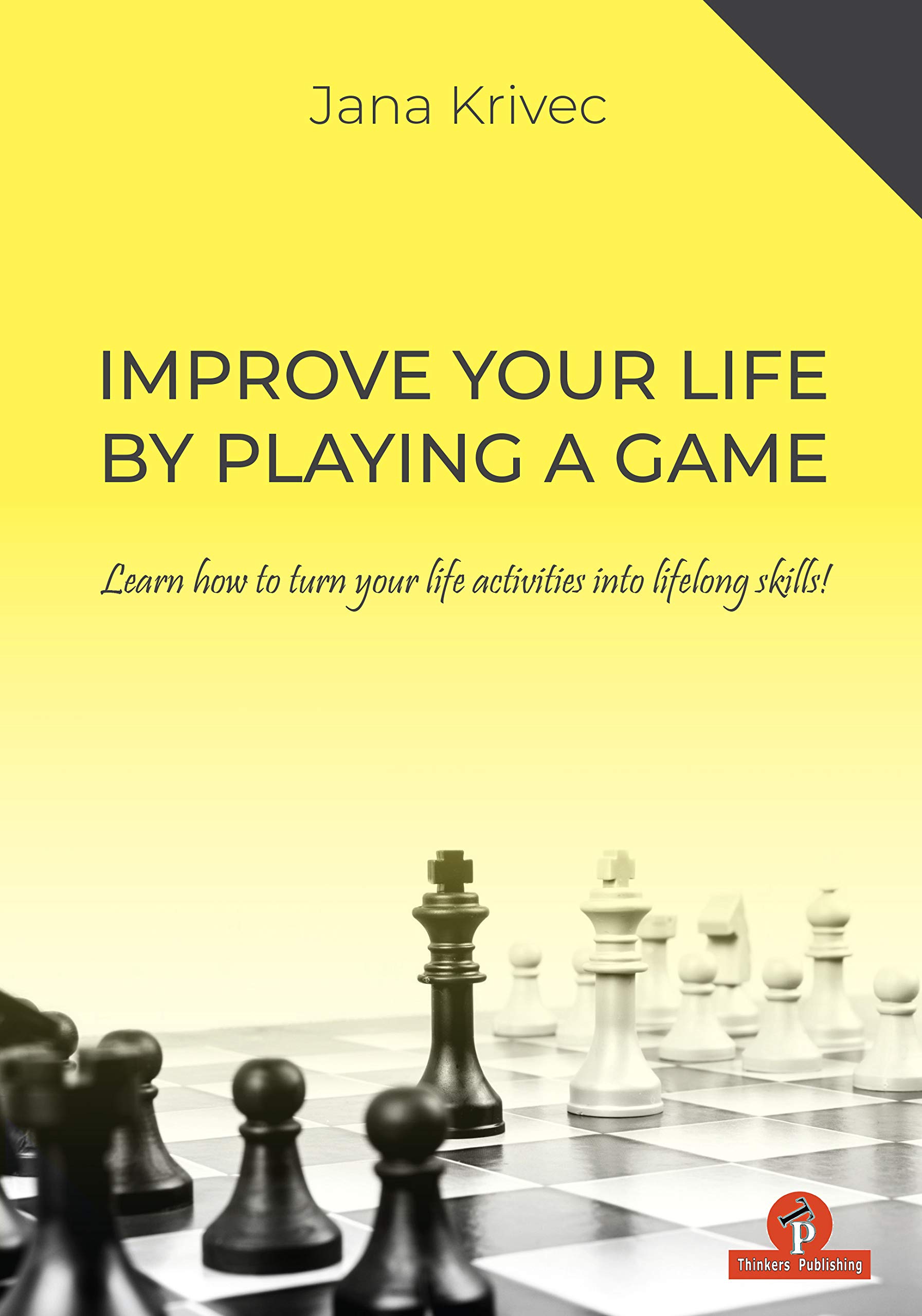
From the author’s introduction:
“This book is partly designed as an autobiographical experience focusing on the processes that arise in the life of a chess player that have be translated into everyday life. In part, the book incorporates psychological theories that generally explain these processes, but overall it can be seen as a guide on how to use any activity to learn skills that will enrich your life. There are several activities in life which can be seen in the same way if we know where and how to exploit the opportunities. The truth is that all aspirations are interconnected when we keep an eye on the thematic links. I believe that this book will give you a new insight into how any ability can be transferred from a particular activity to the universal wisdom of life. It will awaken your networking skills and teach you how to turn life activities into lifelong skills that will improve your well-being. The course of the book follows the typical process of playing chess, starting with training, followed by the tournament situation, the course of the game, the time after the game and the tournament. Since I am not a poet, I have often borrowed some quotations from famous, imaginative and clever people from all over the world. I believe that these valuable thoughts have enriched the book. One thing I ask you to do while reading this book is to open your mind and enjoy the inner journey. So let us go and try to become aware of the processes behind our life activities. Let us find out what and why we do what we do in our daily lives.”

“Jana Krivec graduated from the Faculty of Psychology at the University of Ljubljana in 2004, where she successfully defended her doctoral thesis entitled “Cognitive Information Processing: the Case of Chess” in 2011. In 2004 she worked with the Faculty of Computer and Information Science on a project in which researchers developed a program for automatic annotation of a chess game. She was a researcher at the Department of Intelligent Systems at Jozef Stefan Institute, Ljubljana in the field of artificial intelligence. Her work was presented at several international conferences and published in scientific publications. She is a university professor of Psychology at the School of Advanced Social Studies in Nova Gorica. Jana Krivec is a Women’s Chess Grandmaster with a ELO rating peak of 2362 in 2008. She has been the Slovenian Women’s Champion seven times as well as a member of the Slovenian women’s chess team at eleven Chess Olympiads. At the 2006 Turin Olympics she and her teammates reached ninth place. She has won several international tournaments. Chess has been her passion and will probably remain explicitly or implicitly present throughout her life.”
The well deserved success of Barry Hymer and Peter Wells’ recent book Chess Improvement: it’s all in the Mindset, as well as The Moves that Matter, by Jonathan Rowson, two books which take very different, but essentially ‘serious’ approaches, suggests that there may be a hitherto untapped market for chess self-help books. A book which takes a more populist approach, then, should be welcomed.
What we have here is a book which can be read on two levels: as a self-help book for chess players, and as a book for general readers using chess as a metaphor. But the title: Improve your Life by Playing a Game: what exactly does this mean? By playing one game, by playing chess generally, by playing any game? Bridge? Noughts and crosses? Snakes and ladders?
First impressions are good: a colourful book using nice shiny paper, with copious photographs, illustrations and cartoons as well as callouts in tasteful pastel-shaded boxes. Green for ‘key takeaways’, pink for ‘a minute of self-reflection, and so on.
The chapters take us through a chess tournament. In Chapter 1 we have to train for the tournament. Chapter sections look at goal setting, motivation, self-examination and improvement, discipline, hard work and persistence, learning from the masters, memorization techniques, working with modern technology, delayed reward … and never stop exploring.
In Chapter 2 we’re playing a game. First, we have to prepare for our opponent, then, during the game, we have ‘Always find a meaning’, ‘Focus and concentration’, ‘Systematic thinking, problem solving and decision making’, ‘Activation, patience and responsibility’, Courage and optimistic thinking’, Creative thinking and flexibility’, ‘Being in control of your feelings’, ‘Never stop fighting’ and ‘Ethics’.
After the game, in Chapter 3, we might have to cope with stress and losses, using cognitive techniques, behavioural techniques and understanding that if you don’t fail, you don’t learn.
Chapter 4 suggests what we might do after the tournament. We’re offered ‘A will to change’, ‘Who are you?’, ‘Mind and body work together’, ‘Positivity’, ‘Do what you like’ and ‘Gens una sumus’.
Chapter 5 warns us about the potential negative aspects of chess. Only two pages here, so clearly there’s not much worth talking about.
Chapter 6, Theories and Studies on Benefits of Chess’, moves into rather different territory. We learn about chess and education, and about chess and health problems, though I for one would raise a very strong objection to describing ADHD and Autism Spectrum Disorder as health problems.
Sadly, it’s not the only issue I have with the book. It starts right at the beginning, with the author’s introduction. We start with a quote, ‘Chess is life in miniature’, from ‘Gary’ Kasparov, but in the third line of text underneath he’s granted the preferred spelling of his first name: Garry. Gary and Garry seem to appear fairly randomly throughout the book, as do, for example, Bobby Fisher and Bobby Fischer.
Then we come to the inspirational quotations. You may well find many of them valuable, but there are attribution problems.
Page 37, for instance tells us ‘The only way to get smarter is by playing a smarter opponent’, attributed to a book entitled Fundamentals of Chess, published in 1885, with www.reddit.com as the source. The use of the word ‘smarter’ didn’t sound like 1885 to me, and a quick google located a Kingpin article by Justin Horton, which explained that this was a fictional book mentioned in the Guy Ritchie movie Revolver, where, however, it was given a publication date of 1883.
Page 66 offers ‘One bad move nullifies 40 good ones’, attributed to Vladimir Horowitz, an outstanding pianist, but not noted for his chess mastery. A search revealed that my guess was correct: it was actually written by the chess master and prolific author IA Horowitz, although it has also been misattributed to Bernhard Horwitz. Horwitz, Harrwitz or Horowitz? Vlad, Al, or even Anthony? If you’re looking for inspiration or self-help you might not care, but some of us do.
The advice, while no doubt invaluable to many readers, incorporates a ragbag of ideas familiar to any reader of pop psychology books. We have the Big Five personality traits and de Bono’s Thinking Hats. There’s Kahneman’s Fast and Slow Thinking as well as the Stanford Marshmallow Experiment. All of which is fine and understandable, as they’ll be new to some readers, but they are often presented without criticism or adequate source references. Ericsson’s 10,000 hours is, of course, there, also quoting Malcolm Gladwell, but failing to mention any possible reservations (there are many) or that Gladwell failed to understand Ericsson’s research. Flow is also there, but mysteriously attributed to Alan Watts (or possibly Wats: both spellings appear at the top of page 68): Mihály Csíkszentmihályi, the originator of the concept, doesn’t get mentioned at all. Sometimes, but not always, sources are quoted. Page 25, for instance, offers us ‘Some studies have shown…’ and ‘In one study…’, without any further information. (This is about the possible dangers of external rewards, and I’m sure they’re all quoted by Alfie Kohn, so I can look them up myself, but not all readers will have this knowledge.)
The text is enlivened by many photographs, colourful illustrations and cartoons, taken, with brief acknowledgements, from online sources, but not always either relevant or fully explained.
There is a bit of chess here as well, although, bizarrely, the author uses long algebraic notation but without capture and check symbols.
While talking about marshmallows and instant gratification, Krivec presents us with this position which I’m sure you’ll recognise.
Coincidentally, this is something Joel Benjamin also mentions: “I believe that 8. Qxb7 is the best move. Bobby Fischer would have played it. Or, as you kids would say, Magnus would play it.” Krivec takes a different view: “(Qxb7) is not a good move because it follows the urge for immediate gratification and not the rules of good chess playing.” Far be it from me to argue with a WGM about the best move, but this seems a rather silly thing to say. My view is that both authors missed the opportunity to explain that both Qxb7 and Nc3 are excellent moves: your choice will be a matter of style.
If you want a chess example of the disadvantages of immediate gratification there are thousands of better examples to choose from, including one or two later in this book.
In some of the other chess ‘minutes for self-reflection’ you’re not told whose move it is: not very helpful, I think.
On page 110 we’re learning about creative thinking: thinking outside the box. An important topic, in life as well as in chess. To exemplify this we’re invited to solve the 9 dot puzzle.
A good example, I think, because you literally have to think outside the box to solve it. However, the ‘solution’ on the following page only connects seven of the nine dots and doesn’t go outside the box at all. Again, like so much of this book, unsatisfactory.
It’s all a great pity. I’m sure there’s a demand for a book of this nature, which should appeal to many players at all levels. Taking some well known ideas from psychology and applying them to both studying and playing chess is a great concept which will be inspirational to many readers. Jana Krivec’s passion both for chess and for helping people improve their lives comes through very well. If you can forgive the problems, you’ll probably enjoy and benefit from this book. It certainly contains a lot of valuable, although not especially original, advice about many aspects of both chess and life, as well as exercises in, for example, mindfulness, which many will find helpful.
However, the typos, errors, inadequate referencing and sourcing, amongst other reasons, preclude a general recommendation. It really needed a lot more editorial input, preferably from someone with specific subject knowledge, as well as better proof-reading.
Thinkers Publishing are well known for their high production qualities and excellent books, mostly on advanced chess subjects. It looks to me like, in a praiseworthy attempt to broaden their appeal, they stepped out of their comfort zone.
Richard James, Twickenham 17th April 2021

Book Details :
- Hardcover: 192 pages
- Publisher: Thinkers Publishing; 1st edition (28 Jan. 2021)
- Language: English
- ISBN-10:9464201029
- ISBN-13:978-9464201024
- Product Dimensions: 16.51 x 1.27 x 23.5 cm
Official web site of Thinkers Publishing

